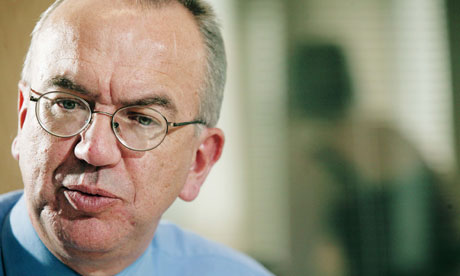Martin Narey confronts shadow justice secretary over his criticism of Ken Clarke's views on cutting the prison population

Martin Narey, former head of the Prison and Probation service, who last night attacked Jack Straw's stance on penal reform. Photograph: Martin Argles for the Guardian
The former prison service director-general Martin Narey last night angrily confronted Jack Straw over his "Daily Mail assassination" of Ken Clarke's landmark prisons speech that could have paved the way for a new cross-party consensus on penal reform.
Narey told Straw that he was "terribly disappointed by your assassination of Ken Clarke in the Daily Mail the next day".
He said Straw as a former justice secretary should have "given Ken Clarke a break when he says that the prison population should go down".
Narey said that home secretaries and justice secretaries could "talk the prison population up or talk it down", and the courts responded. He said Douglas Hurd had "talked down'' the prison population by 4,000 when he was home secretary in the late 1980s: "You can set the scene," Narey told Straw.
The impassioned clash took place at a Fabian Society/Prison Reform Trust Labour conference fringe meeting. Straw did not take the criticism lightly, claiming that Clarke had been widely regarded as a failure as home secretary: "Let me tell you, Martin, we were the first party to get crime down since the war."
For good measure Straw also denounced the record of Hurd, who is currently president of the Prison Reform Trust, saying that although he "greatly respected him, the truth was that when he was home secretary crime rocketed up and the Tories lost the plot on crime".
The exchange had been prompted by Straw seeking to justify his record as home secretary and justice secretary during which the prison population rose from 62,000 to 85,000.
He said he had not wanted to see the prison population go up on his watch. Indeed his policy had been to try to stabilise prison numbers. But he said the size of the prison population was not an objective of his law and order policy but the consequence of Labour's "tough on crime, tough on the causes of crime" approach.
"I am not suggesting that I was some kind of hard bastard ... but you have to take the public with you," he said. He added that when Narey had been his director-general of prisons a lot of work had been done on trying to establish the relationship between prison sentence lengths and reoffending rates to establish what worked.
He insisted, however, that 75% of those in prison were persistent violent offenders who were a danger to the community who, he said, deserved a measure of respite care, which was afforded by sending them to jail for a few weeks.
Straw also defended Labour's record on prison conditions saying the jails were completely different places now to what they were in 1997 including the provision of in-cell televisions which he had pushed ahead with in the face of Downing Street opposition.
Others at the fringe meeting however saw an opportunity for a new political consensus on penal policy in the wake of Ken Clarke's speech with the new Labour leader, Ed Miliband, on record saying he thinks may provide the basis for a cross-party policy on prisons.
The Guardian
28 September 2010
http://www.guardian.co.uk/politics/blog/2010/sep/28/prisons-jack-straw-penal-reform
